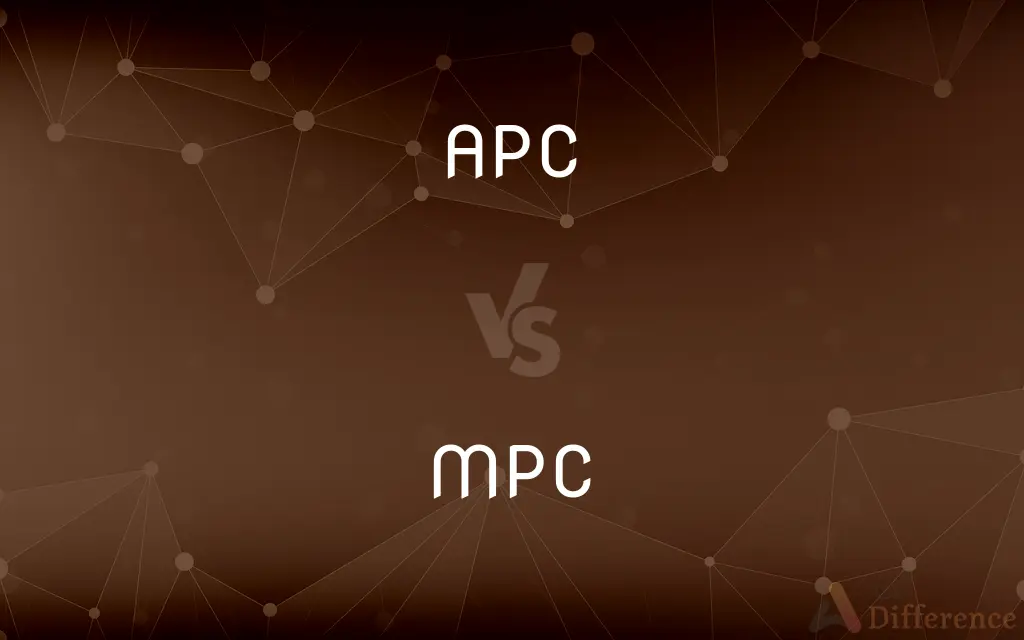APC vs. MPC — What's the Difference?
By Tayyaba Rehman — Published on December 28, 2023
APC (Average Propensity to Consume) is the ratio of total consumption to total income. MPC (Marginal Propensity to Consume) is the change in consumption due to a change in income.

Difference Between APC and MPC
Table of Contents
ADVERTISEMENT
Key Differences
APC stands for Average Propensity to Consume, a metric in economics that measures the proportion of total income that is spent on consumption. On the other hand, MPC, or Marginal Propensity to Consume, gauges the proportion of an additional dollar of income that is spent on consumption.
APC provides an overview of consumption patterns in relation to the total income. If APC is high, it indicates that a significant portion of total income goes toward consumption. Conversely, MPC focuses on incremental changes, assessing how consumption adjusts when there's a change in income.
To calculate APC, one divides total consumption by total income. This ratio gives a broad understanding of consumption habits in an economy. For MPC, it's the change in consumption divided by the change in income, showing the responsiveness of consumption to income fluctuations.
Both APC and MPC offer insights into consumer behavior. While APC provides a general perspective on spending patterns, MPC helps economists and policymakers understand how consumption might change with income shifts, which can be crucial for economic forecasting.
Comparison Chart
Definition
Proportion of total income spent on consumption.
Proportion of an additional dollar of income spent on consumption.
ADVERTISEMENT
Focus
Overall consumption patterns relative to total income.
Changes in consumption due to income fluctuations.
Calculation
Total consumption divided by total income.
Change in consumption divided by change in income.
Interpretation
High APC indicates significant income spent on consumption.
High MPC suggests large consumption shifts with income changes.
Utility
Gives a general view of spending habits in an economy.
Helps understand consumption responsiveness to income changes.
Compare with Definitions
APC
APC is the ratio of total consumption to total income.
With rising incomes, the nation's APC has been fairly constant.
MPC
MPC measures how consumption adjusts with income shifts.
During economic booms, the MPC often rises due to increased consumer confidence.
APC
APC measures the proportion of income spent on consumption.
An APC of 0.8 means 80% of income is spent on consumption.
MPC
MPC assesses the responsiveness of consumption to income changes.
With tax breaks, the MPC can determine the potential boost in consumer spending.
APC
APC provides insights into overall consumption patterns.
By studying the APC, economists can gauge general spending habits.
MPC
MPC represents the change in consumption from a change in income.
A sudden bonus led to an increase in consumption, reflecting a high MPC.
APC
APC reflects the spending habits of an entire economy.
A decreasing APC might indicate increased savings in the economy.
MPC
A high MPC means large portions of extra income are spent.
In some economies, a high MPC indicates low savings rates.
APC
A high APC suggests a significant part of income goes to consumption.
Developed nations often have a relatively high APC compared to developing ones.
MPC
MPC aids in predicting consumption changes due to income fluctuations.
Policymakers use MPC to forecast economic responses to fiscal policies.
APC
(military) an armored vehicle (usually equipped with treads) that is used to transport infantry
APC
A drug combination found in some over-the-counter headache remedies (Aspirin and Phenacetin and Caffeine)
Common Curiosities
How is MPC calculated?
MPC is calculated by dividing the change in consumption by the change in income.
Is a high APC indicative of more spending?
Yes, a high APC suggests that a significant portion of income is spent on consumption.
Can APC be greater than 1?
Typically, APC is between 0 and 1, but in some scenarios where people spend more than they earn (using savings), APC can exceed 1.
Why is MPC useful for policymakers?
MPC helps policymakers understand how consumption might change with income shifts, aiding in economic forecasting.
Which metric, APC or MPC, reflects overall spending patterns?
APC reflects overall spending patterns relative to total income.
How is MPC different from APC?
While APC measures the ratio of total consumption to total income, MPC gauges the change in consumption due to a change in income.
How does an economic boom affect MPC?
During economic booms, MPC often rises due to increased consumer confidence and spending.
Which measure, APC or MPC, is more dynamic in response to economic changes?
MPC is more dynamic as it reflects changes in consumption due to income fluctuations.
What does APC stand for in economics?
APC stands for Average Propensity to Consume.
Can the value of APC and MPC be the same?
In some instances, they can be similar, but they represent different economic metrics.
Can both APC and MPC be used for economic predictions?
Yes, while APC provides general insights, MPC offers a more nuanced view of potential consumption shifts with income changes.
What happens if MPC is close to 1?
If MPC is close to 1, it means most of the additional income is spent on consumption.
Why is studying APC important for economists?
Studying APC helps economists understand general spending habits and the portion of income devoted to consumption.
Do savings influence APC?
Yes, if people save more and consume less, APC will be lower.
How does a tax break influence MPC?
A tax break often leads to increased disposable income, and the MPC can determine the potential boost in consumer spending resulting from it.
Share Your Discovery

Previous Comparison
BSc vs. BEng
Next Comparison
Long Vowels vs. Short VowelsAuthor Spotlight
Written by
Tayyaba RehmanTayyaba Rehman is a distinguished writer, currently serving as a primary contributor to askdifference.com. As a researcher in semantics and etymology, Tayyaba's passion for the complexity of languages and their distinctions has found a perfect home on the platform. Tayyaba delves into the intricacies of language, distinguishing between commonly confused words and phrases, thereby providing clarity for readers worldwide.













































